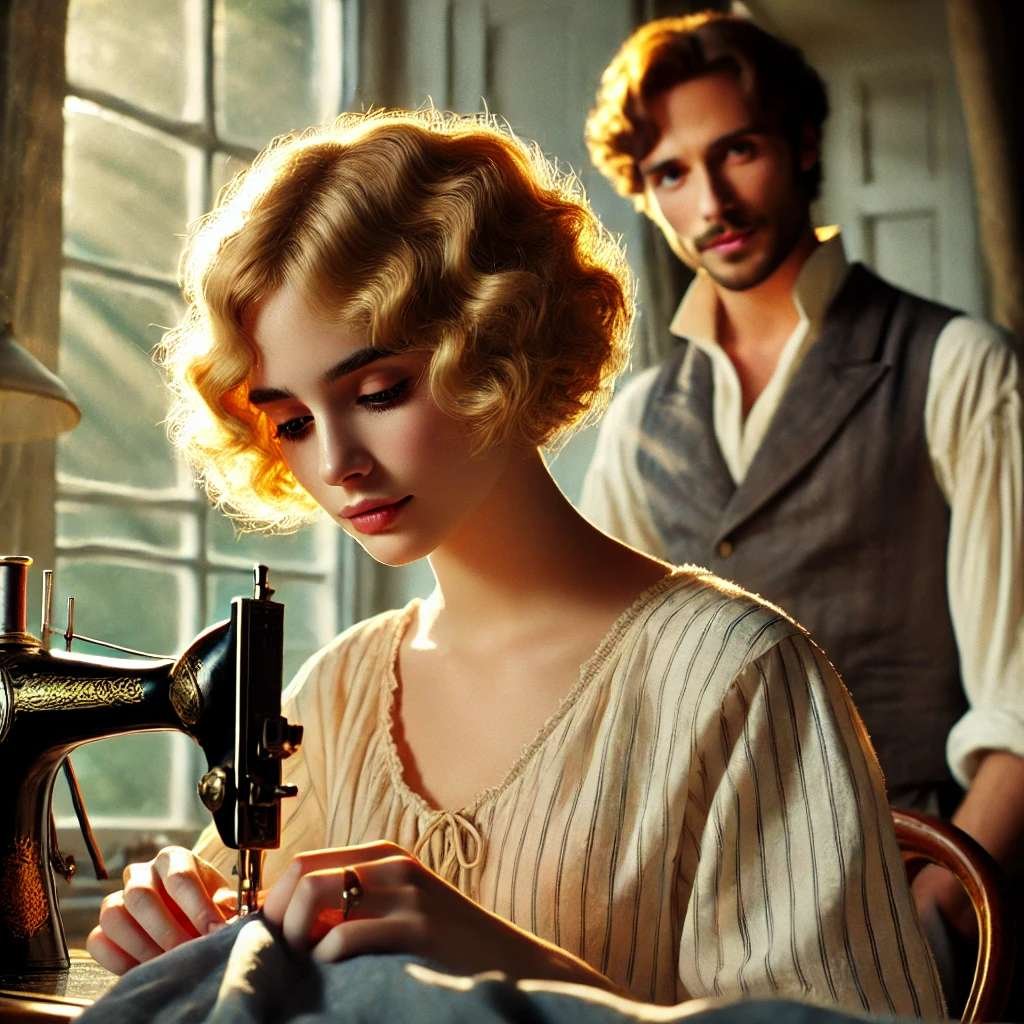A mother and daughter lived, if living it could be called, in a damp attic, reached by descending worn steps carved into the very earth. Light barely penetrated the small barred window; the single room served as their kitchen, bedroom, and living space.
Ellen spent her days confined there, diligently working on her lace and embroidery, never leaving or seeing the sunlight, caring for her ailing mother and consoling her whenever she lamented their misfortune.
These two noblewomen, once owners of estates, lands, and countless jewels, had now been reduced to such dire straits! To sleep by the light of a single lamp, they who had once been illuminated by pages holding candles in silver candelabras!
The impoverished lady could not bear it, and when her daughter, with the calm voice of resignation, advised her to submit to divine will, her lips exhaled impatient murmurs and furious curses.
As misfortunes often increase, one of the harshest winters arrived, and Ellen lost the work that provided their sustenance. Decent poverty turned into black misery; scarcity turned into hunger with hollow cheeks and yellow, long teeth.
With bitter irony, her mother mocked Ellen, who naively believed she could secure bread through incessant labor and constant vigilance. “Such fine bread you’ll have when you go blind! You’ll end up begging with a dog…
Ah, if only you weren’t so foolish and such a bad daughter – with that figure, that face, and that cascade of golden hair down to your feet – you wouldn’t let your mother faint from hunger!”
Hearing these insinuations, Ellen shuddered with shame and wanted to respond angrily; but remembering her mother had been fasting for many hours, she covered her face with her hands and broke into sobs.
Suddenly, as if making a firm and sudden resolution, she stood up, wrapped herself in a dark woolen cloak, and stepped into the street, which she rarely trod, convinced that seclusion was the safeguard of virtue.
Without hesitation, she headed towards a shop she had glimpsed, where she believed she could sell the only treasure she secretly prided herself on.
The shop was owned by the cunning old woman Brasilda, a great mediator with hints of a sorceress. Keeping her face hidden, Ellen entered the dubious establishment.
When Brasilda maliciously asked what the veiled and gallant girl had to sell, Ellen, without revealing her face, turned her back and displayed her splendid blonde hair, more brilliant and softer than silk, which, overflowing from the edge of her skirt, swept the floor.
“I sell this for ten coins,” she exclaimed, “and cut it off immediately.”
The old woman agreed to the proposal, for the hair could make many wigs and hairpieces. Grabbing some scissors, she sheared the copious mane. Noticing that the girl kept her face hidden and seemed to cry softly, she whispered in her ear:
“If you are a maiden and as beautiful as your hair suggests, you could earn not ten coins but a hundred or two hundred when you please.”
Ellen took the money and left without a word. At the door, she crossed paths with a handsome gentleman who didn’t notice her; Ellen did glance at him and found him attractive.
The gentleman entering the witch’s den was Mrs Adam Meneses, the richest, freest, and most unruly young man in the city. He didn’t visit Brasilda for trivial matters but came like a hunter seeking game, having it tracked and cornered to catch it at his leisure.
After a while of conversation, Mrs Adam saw the magnificent blonde hair laid out on a white cloth, shimmering in the dim light like a golden lake.
“Whose hair is that?” the gallant asked, surprised.
“By my faith, I don’t know, son,” replied the old woman. “A girl just came by, very graceful in figure but with her face completely covered; I couldn’t see it. She sold me this hair, took the money, and left mysteriously just before you arrived…”
“Why didn’t you follow her, you crafty thing?”
“Because she’s surely poorer than spiders, and she’ll return to earn the hundred coins I offered her…”
“Damn witch! That hair is mine, and the woman too if she reappears.”
Mrs Adam loosened his purse, carefully took the cloth and its treasure, hid it under his cape, and returned home.
From that day, a surprising change occurred in Mrs Adam. Renouncing his flirtations and adventures, forgetting gambling, mockery, and duels, he seemed like a different man.
He was seen in the streets, the promenades, the churches; his eager eyes searching and scrutinizing constantly, looking for something very important to him. But by evening, he would retire, and in his honest and orderly life, the devout old men with their grave demeanor and large rosaries had nothing to reproach him for.
Some even said the young man, touched by grace, was considering becoming a monk; they couldn’t suspect that Mrs Adam was blindly in love with the blonde hair.
He had placed it reverently, tied with a silk ribbon, on a silver brocade cushion. He would spend long hours before it, either kissing it in an ideal ecstasy of devotion like a revered relic or squeezing it with the frenzy of a lover who wants to tear apart and bite what he adores.
Mrs Adam’s imagination, exalted by the sight of that golden cascade, that mane in which Phoebus seemed to have left his playful rays trapped, and from which a vivid fragrance, a scent of youth and purity emanated, fantasized about the body to which such foliage belonged.
He envisioned the long, flowing, perfumed hair falling in locks and waves over snow-white shoulders, over virginal forms of rose and nacre, or encircling, like a halo of a saintly image, a face with angelic expression, where the blue flowers of luminous eyes bloomed.
There were ideas and suspicions that drove the lovesick man crazy. Who knew if the unfortunate beauty, after selling her hair to preserve her chastity, had had to lose her chastity to preserve her life?
Tormented by such thoughts, Mrs Adam abhorred eating, consumed by rage and burning with strange jealousy. Becoming a street wanderer, he incessantly inquired, trying to see through all shutters and penetrate all grilles and lattices.
All in vain! No youthful head covered with short golden curls of that unique, incomparable shade met his eyes. Mrs Adam grew thin, deteriorated, on the verge of madness whenever the old witch Brasilda, bewildered and disconsolate, repeated, clasping her dry hands:
“She must be a witch too, and flew up the chimney… She doesn’t appear, son, no matter how much I search for her…”
Lost in love, Mrs Adam, feeling he might die of passion and jealous fury, clutched the hair to his heart, its curls caressing his feverish hands, and made a vow:
“Let me find your owner, and whether she is rich or poor, good or bad, noble or of plebeian origin, I will marry her. I swear this to this Crucifix that hears me.”
After making the vow, full of hope and illusion, Mrs Adam went out into the street, and at dusk, heavily cloaked, he was stopped near his door by a poor woman, wrapped and covered in an old woolen cloak.
“Sir,” she said in a plaintive and humble voice, “does your house need a good and diligent seamstress? There’s no work, and my mother has nothing to eat.”
“That’s my house,” Mrs Adam replied distractedly, thinking of his fantastic love. “Come tomorrow; you’ll have plenty of work… Take this as an advance,” and he placed a coin in the outstretched hand.
The next day, Ellen, sitting in the window of Mrs Adam’s house, with a basket of white clothes before her, sewed in silence, not participating in the chatter of the maids.
She suffered from leaving her home, her sick mother, her seclusion; the effort flushed her previously pale cheeks. Sunbeams streamed through the window, catching on the short, silky curls of her uncovered head, which the cloak no longer concealed.
And, by chance, Mrs Adam walked by, so absorbed that he didn’t look at the young seamstress. But she, recognizing Mrs Adam as the gallant gentleman she had remembered ever since she saw him when leaving the witch’s shop, let out an involuntary cry…
Hearing it, Mrs Adam turned, clasped his hands, and thought he was visited by a heavenly apparition, for he recognized the unique shade of the blonde mane in the curled head bathed in sunlight… And, addressing the maids and the servants with authority and pride, he said solemnly:
“Stop your work; today is a day of celebration: greet your new mistress.”
Also Read: An Angel’s Adventure OR The Story of an Hour

